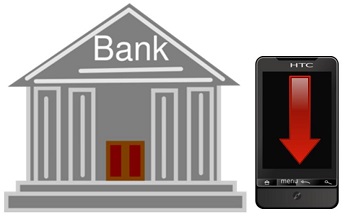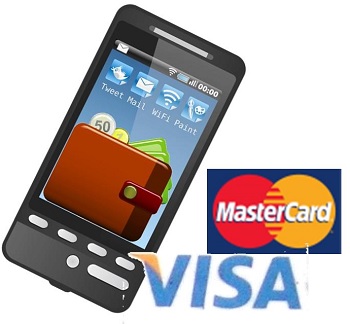Mobile payments are evolving and many banks may be in danger of getting left behind by consumers
The mobile payments space is evolving at a rapid pace and banks are struggling to keep up. Innovative mobile services appear to be launching on a daily basis and many of these services are changing the way people pay for products online and in the real world. Those finding the most success in this field are those outside of the financial service industry, but banks still have a chance to establish a stronger presence in the mobile commerce market.
Rapid adoption of mobile payment services highlights the slow progress banks have made
The rapid adoption of mobile commerce among consumers is pressuring banks to become more mobile-centric. Money transfers are becoming more common on mobile platforms and fewer people are relying on banks for their financial needs. Moreover, those participating in mobile commerce are making use of platforms developed by software firms and not those made by banks. Typically, the platforms developed by banks are seen as cumbersome and somewhat inconvenient to use regularly.
Many banks have an opportunity to engage mobile consumers through simple services
 Banks have existed as the primary money service provider for years. As such, many people still look to banks for the financial institutions that they are and many have faith in their bank’s ability to provide attractive mobile services. Some banks have found success in engaging mobile consumers through the use of simple banking applications. These apps have served as a way for banks to expose themselves to the mobile spectrum and examine what mobile consumers are interested in and what types of services they do not like.
Banks have existed as the primary money service provider for years. As such, many people still look to banks for the financial institutions that they are and many have faith in their bank’s ability to provide attractive mobile services. Some banks have found success in engaging mobile consumers through the use of simple banking applications. These apps have served as a way for banks to expose themselves to the mobile spectrum and examine what mobile consumers are interested in and what types of services they do not like.
Some banks may have to emulate companies like PayPal that have had success in engaging a mobile audience
In order for traditional banks to remain relevant in a world where mobile technology is becoming a dominant force, they will have to find ways to mimic other financial service providers that have an overarching focus on the digital space. PayPal is a primary exemplar of what can be accomplished through an unconventional focus on the mobile space.
As mobile commerce continues to thrive, digital wallets are becoming more important
Mobile wallets may soon be the way of the future. A growing number of applications that are designed specifically to store financial information and data provided by retailers are emerging in the mobile space. These apps are thriving in the popularity of mobile commerce, finding support among consumers that want to pay for products using nothing more than their smartphones and tablets. For Visa and MasterCard, the mobile wallet holds a great deal of promise, but both companies are finding it difficult to engage mobile consumers effectively.
Visa is trying to form a direct connection with consumers
Both Visa and MasterCard have their own mobile commerce services on offer. Visa’s Checkout service was introduced in July and is meant to replace the company’s old digital wallet. Using the service, consumers will be able to pay for goods and services using data on their mobile devices. Visa is using its marketing clout to promote this new mobile wallet, but whether or not the service will prove popular among consumers has yet to be seen. Visa is currently struggling to form a direct connection with consumers, having focused so heavily on its relationship with businesses.
MasterCard wants businesses to integrate its digital wallet
 MasterCard is offering a similar service with its MasterPass platform. The MasterPass application is meant to help make e-commerce more convenient to consumers, but MasterCard is not likely to try to form a direct connection with people using the app. Instead, the company is likely to continue focusing its efforts on providing services to its business partners, allowing them to connect with mobile consumers more dynamically. For MasterCard, creating something new is not the priority. The company wants to see its MasterPass service integrated into existing platforms.
MasterCard is offering a similar service with its MasterPass platform. The MasterPass application is meant to help make e-commerce more convenient to consumers, but MasterCard is not likely to try to form a direct connection with people using the app. Instead, the company is likely to continue focusing its efforts on providing services to its business partners, allowing them to connect with mobile consumers more dynamically. For MasterCard, creating something new is not the priority. The company wants to see its MasterPass service integrated into existing platforms.
Mobile wallets could be the key to omnichannel engagement
Merchants are working to adapt to the idea of omnichannel engagement. In a world where mobile technology has become so prominent, this has proven to be a difficult task. Connecting with mobile consumers is a complicated issue, but mobile wallets may be the key to success in this endeavor. In the coming years, more people are likely to be engaged in mobile commerce, and they will need digital wallets to make their experiences enjoyable.
 Banks have existed as the primary money service provider for years. As such, many people still look to banks for the financial institutions that they are and many have faith in their bank’s ability to provide attractive mobile services. Some banks have found success in engaging mobile consumers through the use of simple banking applications. These apps have served as a way for banks to expose themselves to the mobile spectrum and examine what mobile consumers are interested in and what types of services they do not like.
Banks have existed as the primary money service provider for years. As such, many people still look to banks for the financial institutions that they are and many have faith in their bank’s ability to provide attractive mobile services. Some banks have found success in engaging mobile consumers through the use of simple banking applications. These apps have served as a way for banks to expose themselves to the mobile spectrum and examine what mobile consumers are interested in and what types of services they do not like.
 MasterCard is offering a similar service with its MasterPass platform. The MasterPass application is meant to help make e-commerce more convenient to consumers, but MasterCard is not likely to try to form a direct connection with people using the app. Instead, the company is likely to continue focusing its efforts on providing services to its business partners, allowing them to connect with mobile consumers more dynamically. For MasterCard, creating something new is not the priority. The company wants to see its MasterPass service integrated into existing platforms.
MasterCard is offering a similar service with its MasterPass platform. The MasterPass application is meant to help make e-commerce more convenient to consumers, but MasterCard is not likely to try to form a direct connection with people using the app. Instead, the company is likely to continue focusing its efforts on providing services to its business partners, allowing them to connect with mobile consumers more dynamically. For MasterCard, creating something new is not the priority. The company wants to see its MasterPass service integrated into existing platforms.